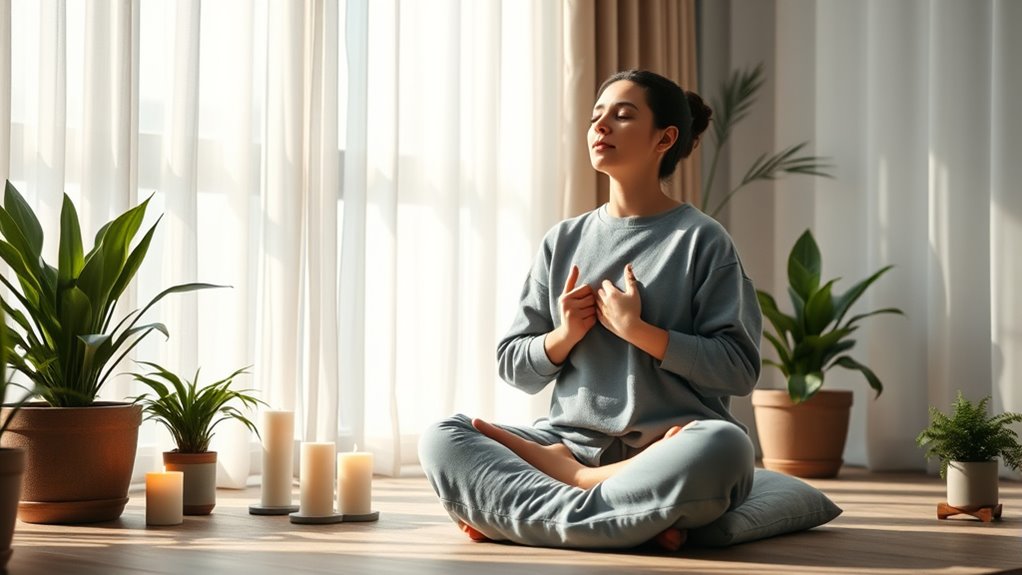As a caregiver, incorporating mindfulness and meditation into your routine can considerably reduce your stress and help you stay present during challenging moments. Even just a few minutes daily of focused breathing or guided meditation can build emotional resilience, improve your patience, and create a sense of calm amid chaos. Regular practice makes handling tough situations easier. Keep going to discover more ways to integrate these techniques seamlessly into your busy life.
Key Takeaways
- Practicing mindfulness helps caregivers stay present, reducing stress and preventing emotional overwhelm.
- Short daily meditation sessions can calm the mind and improve emotional resilience amid caregiving challenges.
- Incorporating deep breathing exercises during stressful moments promotes immediate relaxation and clarity.
- Regular mindfulness and meditation enhance patience, emotional stability, and overall mental health for caregivers.
- Consistent practice makes these techniques more natural, supporting caregivers in maintaining their well-being during demanding times.

Caring for others can be both rewarding and overwhelming, often leaving caregivers feeling stressed and exhausted. It’s easy to forget that taking care of yourself is just as important as tending to your loved one’s needs. Incorporating self care techniques into your daily routine helps you build emotional resilience, enabling you to handle challenges with greater patience and clarity. Mindfulness and meditation are powerful tools that can support your mental health, reduce stress, and restore your sense of balance. These practices encourage you to stay present in the moment, rather than being overwhelmed by worries about the past or future. When you start practicing mindfulness, you learn to observe your thoughts and feelings without judgment, which can prevent stress from spiraling out of control. Meditation, on the other hand, provides a structured way to calm your mind, helping you detach from constant mental chatter and find a sense of peace even amid chaos. Developing a regular practice of mindfulness can significantly improve your emotional stability over time.
You might think that finding time for mindfulness or meditation seems impossible, especially when your schedule is packed with caregiving duties. But even just a few minutes each day can make a significant difference. For example, you can practice deep breathing exercises whenever you feel overwhelmed, focusing on slow, deliberate inhales and exhales. This simple self care technique instantly helps lower your heart rate and clears your mind. As you develop a routine, you’ll notice how mindfulness encourages you to pause and assess your feelings instead of reacting impulsively. Over time, this builds emotional resilience—your ability to bounce back from stressful situations and maintain a sense of calm. Meditation can be as brief as five minutes a day, using guided recordings or focusing on your breath. Consistency is key; the more you practice, the more natural these techniques become, helping you stay centered even during the most demanding moments.
Frequently Asked Questions
How Can Caregivers Fit Mindfulness Into a Busy Schedule?
You can fit mindfulness into your busy schedule by integrating it into your daily routines. Use short moments for self-care routines, like mindful breathing during breaks or while waiting. Practice quick mindfulness exercises, such as focusing on your senses during chores. Effective time management helps carve out these brief, intentional pauses, making mindfulness manageable without adding extra stress, so you stay centered even on hectic days.
Are There Specific Meditation Techniques Best for Caregiver Stress?
Imagine channeling your inner Zen as if you’re a modern-day monk. Guided imagery helps you visualize peaceful scenes, reducing stress quickly. Loving kindness meditation fosters compassion for yourself and others, easing caregiver strain. These techniques are practical, effective, and can be done in just minutes daily. Incorporate guided imagery and loving kindness meditation into your routine to combat stress, boost resilience, and find moments of calm amidst your busy caregiving life.
Can Mindfulness Improve Relationships With Care Recipients?
Yes, mindfulness can improve your relationships with care recipients by strengthening emotional connections and enhancing communication skills. When you practice mindfulness, you become more present and attentive, which helps you better understand their needs and emotions. This increased awareness fosters empathy and patience, making your interactions more meaningful. As a result, your care recipient feels more supported and valued, leading to a deeper, more trusting bond between you both.
What Are Quick Mindfulness Exercises for Immediate Stress Relief?
When you’re feeling overwhelmed, try quick mindfulness exercises like deep breathing techniques—inhale slowly for four counts, hold, then exhale for four. Pair this with a quick body scan: focus on each part of your body from head to toe, noticing tension and releasing it. These simple practices help you ground yourself instantly, reducing stress and restoring calm in moments of need.
How Do I Stay Consistent With Meditation Practices as a Caregiver?
You might wonder how to stay consistent with meditation as a caregiver, but the secret lies in time management and self-compassion. Prioritize short, daily sessions, even if it’s just a few minutes, and forgive yourself if you miss a day. Embrace progress, not perfection, and gradually build your routine. This gentle approach keeps you motivated, making meditation a natural part of your busy life.
Conclusion
By practicing mindfulness and meditation, you can find moments of calm amid your busy caregiving days. Imagine yourself taking a deep breath as your loved one rests nearby, feeling more centered and less overwhelmed. Like Sarah, who started with just five minutes of meditation each morning, you’ll gradually notice increased patience and inner peace. Small steps can create lasting change, helping you stay resilient and compassionate for both yourself and those you care for.









